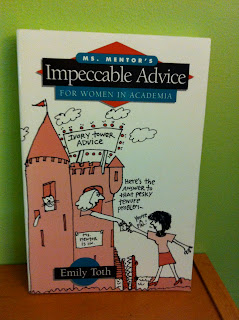Coda: Getting Tenure

The tenure track was a very long track, like the extended-play dance remix of a very long song, and now the time has come to sounds its final notes. In talking about tenure I join a chorus; in addition to the Chronicle forums about Balancing Work and Life and The Tenure Track , lately some people are talking back about the tenure process on the internet. The first I saw of it was " The Awesomest 7-Year Postdoc ," which asserts that you can work for about 50 hours a week and still have a family life, if you organize everything and keep to a schedule. Organizing everything is basically what I did to get tenure, but I did it my own way and with a lot of reflection up front, in the middle, and in this present coda. What I've learned more than anything else is that, depending on your productivity style, academic field, and goals, there are so many great ways to do this work. There are myriad smart, creative, and effective ways to get tenure. Aft...
